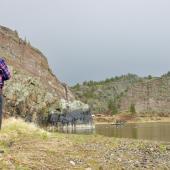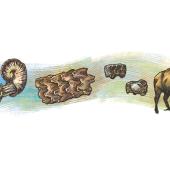Woman at Work: Liz Marchi
Profile of Liz Marchi: Founder of Frontier Angels Fund
Distinctly Montana GAL
"But more rare still, Marchi is among a handful of women in America to have established her own angel fun - the first in Montana of any kind."

Liz Marchi lives and works on one of the most desirable pieces of ground in western Montana. Marchi Angus Ranch is perched atop a river wild, where the frenzied Buffalo Rapids crash through the original canyon of the Flathead River, just outside Polson.
She married longtime cattle rancher Jon Marchi in 2005 and the pair run a herd of 225 Angus and 175 Wagyu cattle—the latter of which has helped propagate a rare breed of beef coveted both for its health benefits and its buttery tenderness.
But for all those thundering hooves, it is also home base to Montana’s first organized angel investment fund.

Montana may seem the unlikeliest place for an angel investor group, but Frontier Angels Fund, LLC founder Liz Marchi long ago saw investment in Treasure State enterprise as an obvious choice.
Marchi came to Montana from North Carolina in 2000 to head a privately funded economic development corporation in the Flathead Valley. Her post enabled connections with many high net-worth investors, all of whom had private capital and had been seeding companies where profits would be hard won.
At that time, opportunities for entrepreneurial funding here seemed few and far between. Banks lend on cash and collateral, and entrepreneurs have neither of those, so an angel investment group seemed a good next step.
In her economic development role, Marchi had been working with a company in Libby with a proprietary product extracted from the sap of the Larch (Tamarack) tree, and which eventually found purpose in the hands of hair and skincare giant Aveda.
“It was a traditional industry that found a way to pivot and apply a natural product to a $9 billion nutraceutical market,” she says.
Marchi had heard that RAIN Source Capital CEO Steve Mercil received a large foundation grant to seed capital in rural markets. She founded Frontier Angels as part of the RAIN Source network. Her first fund opened to investors in September of 2000.
Frontier Angel Fund, LLC closed in 2006 after raising $1.75 million, and began investing in proprietary products and the entrepreneurs who fueled them. The fund made 19 total investments, she says, with 14 of those still active.
The fund’s first investment was in a company called GenPrime, which developed a proprietary strip measuring yeast content in liquids, leading to a rapid scan drug test that took the company global. The United States Postal Service has used the GenPrime strip to detect the presence of anthrax.
They are a prime example, she said, of how entrepreneurs get into the marketplace and soon discover that their original ‘secret sauce’ idea becomes something else completely.

The fund also invested in Pacinian, which has been its best deal to date. The company’s tactic TouchPad™ technology helped broaden customer interface solutions by way of a razor-thin keyboard and has, so far, offered investors the greatest return on the dollar.
“We invested $250,000 for a stake in that company,” she says. Founded in 2004, the company was later purchased for $30 million, giving investors in the first Frontier fund a great return.
A fund needs to have two or more of those type returns, she says, to be considered truly successful.
Angel investing isn’t just about fueling the dreams of big ideas, however. Marchi points out that it can also be the riskiest type of investment. Thus, it is also among the most regulated to ensure only those that are financially able, accredited investors assume the risk of loss.
“There are a lot of rules imposed by the Securities and Exchange Commission,” Marchi said. From the moment a fund attracts a first investor to write a check, she says, the clock begins ticking and if the fund’s capital requirements aren’t met within a certain timeline, the money must be returned.
Stringent qualifiers, including specific net worth requirements, are in place to prevent average and other earners from losing their net worth in a single fund, and guard against predatory funders.

Investments target proprietary technology, such as software, chemical compounds, solutions to problems, and things that make life better. Angel investors don’t typically seed ideas. Products must already be developed and being used in the marketplace.
The fund finds investments through a variety of methods, including word-of-mouth recommendations from angels, ‘pitchfests’, business incubators like The Launch Pad at Montana State University, at the University of Montana, or through other investment syndicates.
The Frontier Angel Fund II Web site says it will fund companies “with a desire and plan to scale and exit”—creating expedience and profit. But for Marchi, it’s also about drawing global attention to Montana and its enterprise.
“We want to focus on wealth and wage creation,” she says. “We want that money to stay here in Montana.”
Software company RightNow Technologies, founded in Bozeman in 1997 without initial venture capital, was purchased by Oracle for $1.5 billion in 2011. Marchi says it’s a great example of a company born here, which remains here, and continues to pay top wages that benefit Montanans.
Marchi is among a growing number of women across the United States with both the capital and the business acumen to bank on entrepreneurial ventures. In 2012 Forbes reported that women angels represented nearly 22 percent of the angel market – a significant increase from 2011 figures of 12 percent.
“From the start, I was adamant about having women investors involved—it’s been a strong strategic focus of mine,” she says. Every fund across the United States agreed that having more than one woman in the room was important, she says.
Women are different decision-makers than men. Women also buy and value different products. In Fund Two, Marchi says she has seen many more couples interested in angel investing and a number of couples who own units together and individually.
Frontier Fund II had its initial close in December 2014. To learn more about the fund, or angel investing, contact Liz Marchi: [email protected].
* * * *
About the Author: Lori Grannis has written features for many national publications, including Shape, Oxygen, and Flex Magazine, as well as regional ones, including Missoula Magazine, 406 Woman, and Clark Fork Journal. A former columnist for the Missoulian for six years, she currently writes news stories for Thomson-Reuters from her Montana home in Missoula. Reach her by e-mail at: [email protected].












Leave a Comment Here